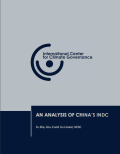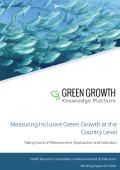

Given the broad (economic, social and environmental) objectives of a green economy, and the limitations associated with mainstream measures of economic performance (such as gross domestic product), an alternative or expanded set of indicators is required for measuring progress toward a green economy. This article develops a composite index for measuring green economic performance, based on 26 indicators across the economic, social and environmental dimensions. The index will enable comparison of a country's green economic performance both over time and relative to other countries. Furthermore, the index is constructed in such a way as to allow for disaggregation (i.e. for scores on individual components to be seen at a glance), such that areas of specific concern can be easily identified and addressed, and progress in each area monitored over time. The index was tested on data from 193 countries, and the resulting country rankings were assessed.

On 30 June 2015, the Chinese government submitted its Intended Nationally Determined Contribution (INDC), detailing its commitment to climate change mitigation and adaptation for the post-2020 period. This article offers an analysis of China’s INDC in terms of its basic assumptions and considerations, the ambition and fairness of the intended contributions, and the obstacles and challenges facing China in achieving these goals.

Eco-innovation has been identified as one of the key drivers of change that need to be harnessed for a sustainable future. Given the complexity of eco-innovation as a concept, there are various challenges to measuring its progress. This CEPS Working Document briefly explores the evolution of the concept of eco-innovation and emphasises its role in the EU 2020 strategy. It then gives an overview of the different measurement approaches and challenges associated with identifying and using indicators for measuring progress in eco-innovation. Within this context, the paper describes the added value and key features of the www.measuring-progress.eu web tool, which aims to improve the way in which policy-makers and others involved in the policy process can access, understand and use green economy and eco-innovation indicators. The web tool was developed as part of a systematic overview by the NETGREEN project research team of the large and fragmented body of work in the field of green economy indicators. The paper concludes with a number of messages for policy-makers in this field.
